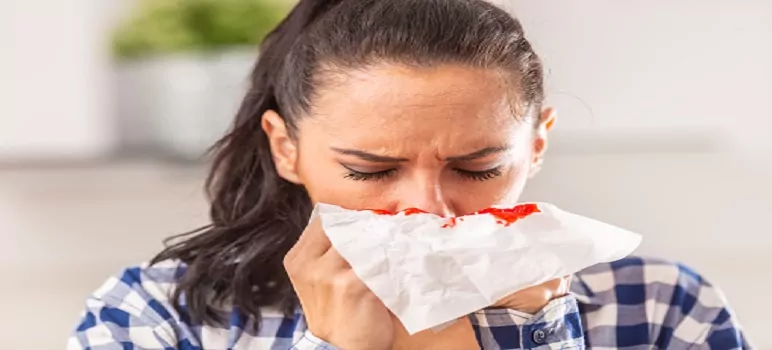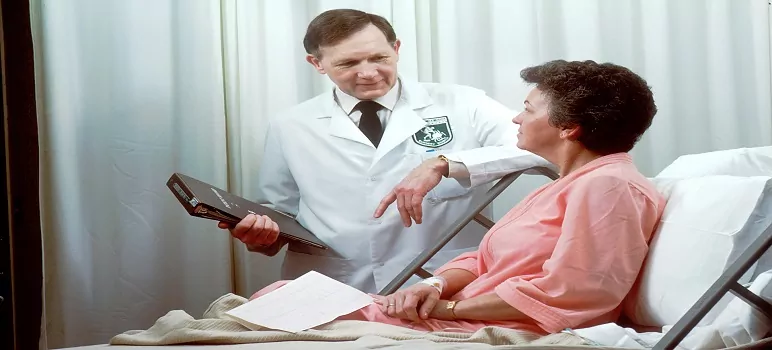Causes of Nose Bleeding: When you have a nose bleed, it’s not something that you can ignore. Nose bleeds are usually a sign of something being wrong with your health. Your nose bleeds when the blood vessels inside become weak and rupture, causing blood to leak out through your nostrils. It is not an uncommon occurrence and there are many reasons why this happens to you or anyone else.
If you experience nosebleeds, here are some things that might be causing it. Keep reading to know more about the causes of nose bleeding so you can take action and prevent it from happening again.

Types of Nose Bleeding
There are primarily two types of. Out of these two, one type of nose bleeding is much serious than the other.
- Anterior nosebleed
- Posterior nosebleed
Anterior Nosebleed
The lower portion of the wall between the two sides of the nose, in the front of the nose, is where an anterior nosebleed first appears (called the septum). The capillaries and tiny blood vessels near the front of the nose are delicate and are prone to breaking and bleeding.
The most typical sort of nosebleed, which is typically not serious. Children tend to experience these nosebleeds more frequently, and they may typically be treated at home.
Posterior Nosebleed
Deep inside the nose, there is a posterior nosebleed. The bigger blood vessels at the back of the nose, close to the neck, are bleeding, which is the source of this nosebleed. Compared to an anterior nosebleed, this one may be more dangerous.
It may cause significant bleeding that runs down the back of the throat. For a nosebleed of this nature, you could require immediate medical assistance. Adults are more likely to get this kind of nosebleed.
Who experiences nosebleeds?
A nosebleed may happen to anybody. A lifespan will typically include at least one. But some people are more prone to bleeding from the nose. They comprise:
- Pregnant ladies. While pregnant, blood vessels in the nose enlarge, putting additional pressure on the sensitive blood veins that line the inside of the nose.
- Kids in the age group of two to ten. Children are more prone to nosebleeds because of their unusual exposure to dry air, colds, allergies. They also insert fingers and items into their noses that can cause nose bleeds.
- Adults who are 45 to 65 years old. In middle age and older individuals, blood clotting times may be prolonged. They are also more prone to have high blood pressure, atherosclerosis (hardening of the artery walls), a bleeding condition, and to regularly use blood thinners like aspirin.
- Individuals who use blood-thinning medications, such as aspirin or warfarin.
- Those who suffer from blood clotting abnormalities such haemophilia or von Willebrand disease.
Common Causes of Nose Bleeding
Nosebleeds can have a variety of causes. Rarely is a sudden or irregular nosebleed life threatening. If you experience nosebleeds frequently, you may be dealing with a more huge issue.
The most frequent reason for nosebleeds is dry air. The nasal membranes, which are tissues inside the nose, can become dry by utilising a central heating system and living in a dry environment.
The nose becomes crusted as a result of this dryness. Crusting could itch or annoy you. Your nose may bleed if it is picked or scratched. Antihistamines and decongestants can dry up the nasal membranes and induce nosebleeds whether taken for allergies, colds, or sinus issues. Another reason for nosebleeds is frequent blowing of the nose.
12 other causes of nose bleeding
| Cold air | Picking the nose | Upper respiratory infection | Allergic reaction |
| Injury to the nose | Repeated sneezing | Chemical irritants | Large doses of aspirin |
| Cancer | High blood pressure | Bleeding disorders | Blood clotting disorders |
Causes of Nose Bleeding in Children
Blockages in the nose: A child may bleed from their nose if they put a toy or other small object up their nose, which might irritate the nasal lining. This may occasionally necessitate a visit to the doctor or emergency department in order to have the object removed.
Child picking its nose: When children touch their noses, they frequently experience trauma that causes nosebleeds.
Dry air: “Winter is a more common time for nosebleeds because of the dryness and heat in houses and other places. The similar type of thing can develop in the nose if you don’t moisturize your skin, according to Pleasant.
Getting hit on the nose while playing: This can be a reason of nose bleeding in children.
Disorders of bleeding: Children who struggle with clotting or bleeding difficulties may get unforeseen nosebleeds. Nosebleeds alone are unlikely to be a sign of a bleeding disorder because children with these disorders often also experience additional bruising or clotting abnormalities.
Having allergies: Kids with allergies may occasionally experience higher nosebleeds. Such as high fever or a dust mite allergy.
What causes nosebleeds while sleeping?
Nasal membrane drying brought on by dry air, allergies, colds, and other upper respiratory illnesses that harm the fragile nasal membrane lining your nose are the same causes of nosebleeds that happen while you’re sleeping. Another possible cause of nighttime nosebleeds is sleeping with your head to one side, which can place direct pressure on the nasal cavity.
Causes of nose bleeding in summer

When the small blood vessels lining the inside of your nose break, you will have nosebleeds, also known as epistaxis. Several things can contribute to this; the two most frequent ones are dry air and nose picking.
Other factors include trauma, sinus infections, allergies, deviated septum, hypertension, bleeding problems, chemical irritants, excessive decongestant nasal spray usage, high altitudes, and extremely cold or hot conditions. In Pennsylvania, the summer and winter seasons are the times when nosebleeds are most frequent.
4 Steps on How to stop nose bleeding
- For at least 10-20 minutes, sit down and gently press down the area of your nose right above your nostrils.
- Blood will flow into your nose instead of the back of your throat if you lean forward and breathe through your lips.
- On the bridge of your nose, apply an ice pack or a bag of frozen vegetables wrapped in a towel.
- Instead of lying down, maintain your upright position to lower the blood pressure in your nose’s blood vessels and prevent future bleeding.
The majority of the time, you won’t need to visit a doctor if the bleeding eventually stops. You could, however, require further care in limited cases.
7 Ways on How to Prevent Nosebleeds
While there are certain things you can do to help reduce or prevent nosebleeds, you can’t always prevent them from occurring.
Best Ways to prevent Nose Bleeding
- Maintain moisture in your nose’s inside:
Rhinitis can be brought on by dryness. Apply a small layer of petroleum jelly to your nose with a cotton swab three times each day, especially right before bed. In addition to this, you can also apply an antibiotic ointment like Polysporin or Bacitracin to maintain the moisture inside the nose.
- Keep your nostrils clean:
Don’t blow or massage it too vigorously. Keep your child’s fingernails short and tell them not to pick their noses if they are experiencing nosebleeds.
- Avoid overusing antihistamines and allergy medicines
These could make your nose dry. Some drugs have the potential to worsen or even start nosebleeds. You might need to talk to your doctor about your prescriptions. However, continue taking them until your doctor instructs you to stop.
- Utilize a saline nasal spray:
It keeps the inside of your nose wet by spraying it in your nostrils.
- Apply a humidifier:
The dry air in your home may be the reason of your dry nostrils.
- Avoid smoking:
Smoking can dry up and irritate the inside of your nose.
When to consult a doctor for nose bleeding

- Young children under the age of two have nosebleeds.
- Your nosebleeds come and go on a regular basis.
- If the bleeding doesn’t stop, you may be taking an anticoagulant (drug that thins the blood), like warfarin, or you may have a clotting disease, like haemophilia.
- Your pale skin, shortness of breath, and heart palpitations are anaemia symptoms.
Frequently Asked Questions
Can stress cause a nosebleed?
Healthline.com reports A nosebleed can come from or be accompanied by headaches, which can occasionally be brought on by stress. A nosebleed may also occur if you constantly pick at or blow your nose while you’re feeling anxious or agitated.
Can High BP cause nosebleeds?
The American Heart Association states that unless you experience an exceptionally high blood pressure episode known as a hypertensive crisis, high blood pressure does not cause nosebleeds.
What food causes nosebleeds?
Other items that had been linked to an increase in epistaxis were discovered to be high in salicylates (red wine, spices, chocolate, coffee, and some fruits), omega-3 fatty acids like oily fish, salmon fish, or natural antiplatelet action that includes ginkgo biloba, ginseng, garlic, ginger, and vitamin E15). These foods can cause nosebleeds.
What should you not do during a nosebleed?
1) Don’t Pick your nose or blow it forcefully.
2) Don’t Bend over for a long period of time.
You may also be interested in: